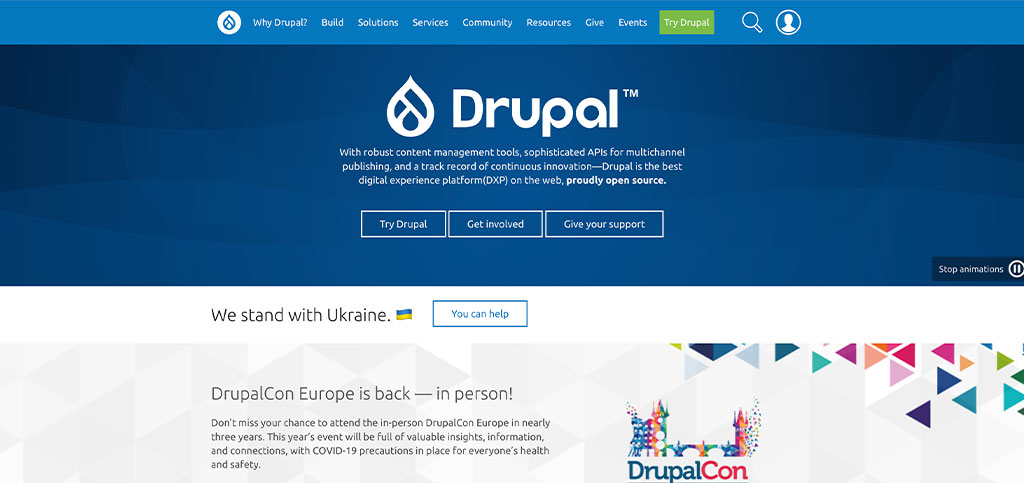
When it comes to choosing the right content management system for your website, it’s essential to weigh the options carefully.
Drupal and Squarespace are popular content management platforms offering distinct features and catering to different needs.
In this comparison, I’ll delve into the strengths and weaknesses of each platform, providing you with an informed perspective to help you make an educated decision.
As a web developer with extensive knowledge of these platforms, I aim to provide trustworthy insights to guide you toward the CMS that best suits your requirements.
Table Of Contents
What Is Drupal?
Drupal is one of the most popular content management systems that offers powerful capabilities for building beautiful websites. However, regarding ease of use, Drupal can be more challenging than other platforms.

It provides extensive customization options but requires a higher level of technical expertise, including working with code during the initial setup and customization process.
Despite the learning curve, Drupal offers built-in tools for content management, allowing users to create and organize website content effectively.
Additionally, Drupal offers many plugins to enhance site functionality and improve page performance.
While it may require more effort to master, Drupal remains a favored choice for those seeking a highly customizable and scalable website solution.
What Is Squarespace?
Squarespace is a popular all-in-one website building and hosting platform that allows users to create professional-looking websites without the need for extensive technical knowledge or coding skills.

It was founded in 2003 and has gained a significant user base due to its user-friendly interface and visually appealing templates.
Squarespace offers a range of features and tools that make website creation and management accessible to individuals, small businesses, and even larger enterprises.
It provides a drag-and-drop editor, allowing users to easily customize their website’s layout, design, and content.
Users can choose from various professionally designed mobile-responsive templates, meaning they automatically adapt to different screen sizes.
Ease of Use Comparison
Drupal
Drupal, a popular content management system, offers powerful website-building capabilities. However, regarding ease of use, Drupal can be more challenging than other platforms.
It provides extensive customization options, but it requires a higher level of technical expertise, including working with code during the initial setup and customization process.

Despite the learning curve, Drupal offers built-in tools for content management, allowing users to create and organize website content effectively.
Additionally, Drupal offers many plugins to enhance site functionality and improve page performance.
While it may require more effort to master, Drupal remains a favored choice for those seeking a highly customizable and scalable website solution.
Squarespace
Squarespace is renowned as one of the most user-friendly content management systems, allowing users to effortlessly create beautiful websites using its built-in features, professionally designed templates, and intuitive interface.
Squarespace, renowned for its emphasis on aesthetics, empowers users to effortlessly create beautiful websites that captivate visitors with its stunning pre-designed templates and intuitive customization options.
In my personal experience, I found Squarespace to be incredibly straightforward to use, with its drag-and-drop editor and visually appealing templates making it a breeze to design and customize my website.
Customer Support Comparison
Drupal
Drupal excels in providing a high-quality support system with a dedicated community, extensive documentation, and built-in features to assist users in managing their sites effectively and addressing any issues that may arise.

I have received prompt and helpful support from the Drupal community when facing challenges, which has allowed me to overcome obstacles and fully leverage the platform’s powerful functionality for my website’s needs.
Squarespace
Squarespace is known for delivering excellent support to its users, ensuring they receive prompt assistance and guidance when managing their sites and addressing any inquiries or concerns.
Squarespace support is widely recognized for its comprehensive documentation, responsive customer service, and helpful community forums, making it a reliable choice for individuals and businesses seeking reliable support for their website needs.
Content management systems have transformed the web, allowing anyone to publish and manage their content without the need for technical expertise.
– Matt Mullenweg, Founder of WordPress
Pricing Comparison
Drupal
As an open-source CMS, Drupal is free to use, but building and maintaining a Drupal website may involve additional costs.
Customization and development by web professionals, hosting services, premium themes and modules, ongoing maintenance, and support or training resources can contribute to a Drupal website’s overall cost.

While Drupal’s open-source nature can save on licensing fees, it’s important to consider these associated expenses when budgeting for your project.
Squarespace
Squarespace offers a range of pricing plans to suit different needs. Their website plans cater to various purposes, from personal websites to e-commerce platforms.
Subscription fees are charged monthly or annually, with potential savings for annual subscriptions.
Additional features like advanced analytics and e-commerce functionalities may vary depending on the plan.
Squarespace provides a free domain for the first year but charges for subsequent years. For e-commerce plans, transaction fees apply, although higher-tier plans may have lower fees or waive them entirely.
Squarespace also offers a free trial period, allowing users to explore the platform’s features and capabilities before committing to a specific pricing plan. If the pricing plan doesn’t meet your needs, check out some of the Squarespace alternatives.
Drupal Vs. Squarespace: Which One is Better?
In the comparison between Drupal and Squarespace, it’s evident that Squarespace emerges as the better option for most users. Its user-friendly interface, pre-designed templates, and integrated hosting simplify website creation and management.
While Drupal offers extensive customization, it demands significant technical expertise. Squarespace strikes a balance between functionality and accessibility, making it ideal for individuals and small businesses seeking a polished online presence without grappling with intricate development.
For a hassle-free yet robust website building experience, Squarespace clearly takes the lead over the more complex Drupal platform.
Our #1 Recommendation: Squarespace
ease of use
Support
Pricing
